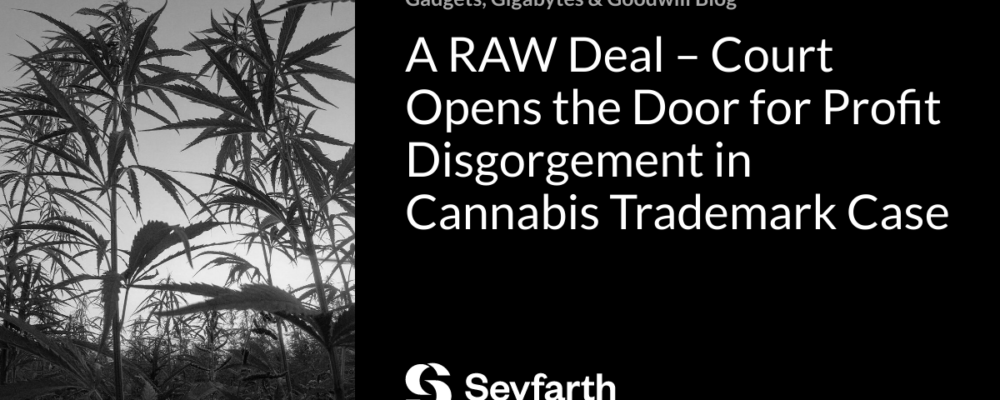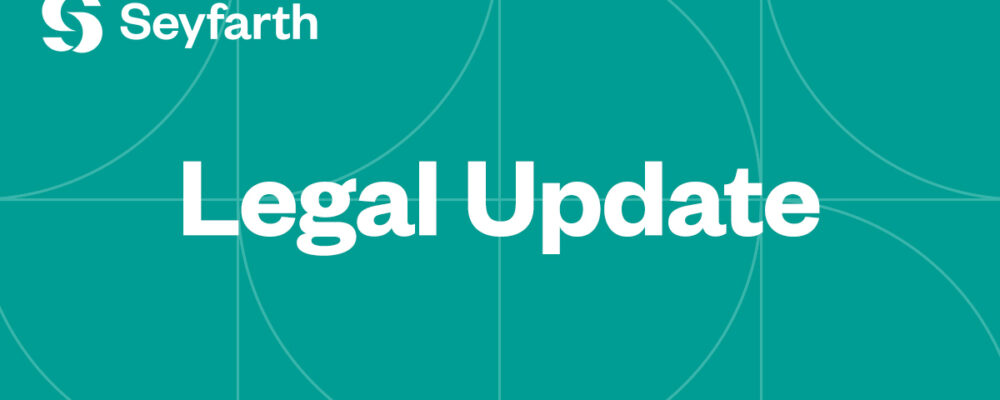By: Erin Dougherty Foley, Sara Eber Fowler, Taylor Iaculla, Ridhima Bhalla, and Hannah Sosenko
Seyfarth Synopsis: On January 1, 2025, employers in Illinois must be poised to comply with the looming changes to a host of existing and newly enacted employment laws. The changes reflect the state’s ongoing expansion of workers’ rights and addressing issues of employment discrimination, harassment, retaliation, and freedom of speech.
Illinois Human Rights Act Amendments
Period to File Complaints: On January 1, 2025, several amendments to the Illinois Human Rights Act (“IHRA”) will go into effect. Notably, the amendments more than double the time period for filing a charge of discrimination, harassment, or retaliation. Complainants will now have 2 years from the date of the alleged violation – instead of the current 300 days – to file complaints with the Illinois Department of Human Rights.
Expanded Protected Classes: The amendments also add new protected classes to the IHRA.
Family Responsibilities: Under the amended Act, employers are prohibited from discriminating against an employee, or prospective employee, based upon the employee’s “family responsibilities.” Family responsibilities include an employee’s actual or perceived responsibilities to provide personal care to a family member. Personal care includes:
- activities related to meeting a covered family member’s basic medical, hygiene, nutritional, or safety needs are met;
- providing transportation to a family member who is unable to meet such needs;
- time spent providing emotional support to a covered family member with a serious health condition who is receiving inpatient or home care.
Reproductive Health Decisions: Similarly, the IHRA will prohibit discrimination on the basis of “reproductive health decisions.” In doing so, Illinois joins several other jurisdictions that prohibit discrimination on this basis. Reproductive health decisions include a person’s decisions regarding contraception, fertility care, assisted reproductive technologies, miscarriage management care, healthcare related to the continuation and or termination of pregnancy, and any pre-, intra-, or postnatal care.
Illinois Equal Pay Act Amendments
The Illinois Equal Pay Act will require that employers with 15 or more employees disclose “pay scale and benefits” in all job postings. The mandatory disclosures must include the wage or salary (or the wage or salary range), along with a general description of benefits and other forms of compensation, such as bonuses, stock options, and other incentives the employer plans to offer for the position. These pay disclosure requirements apply only to jobs that:
- will be performed, at least partially, in Illinois; or
- will be performed outside of Illinois if the hired employee will report to a supervisor, office, or other work site located in Illinois.
Another critical aspect is the emphasis on transparency regarding internal promotional opportunities. Employers are required to announce, post, or otherwise make known all opportunities for promotion to current employees no later than 14 calendar days after making an external job posting for the same position. Employers must also maintain records of job postings, pay scales, benefits, and wages for each position for at least five years. (Seyfarth’s prior update on these changes is available here.)
Worker Freedom of Speech Act
Reflective of the increased efforts limiting employers’ ability to conduct “captive audience” meetings, the Worker Freedom of Speech Act will prohibit employers from threatening to take or taking any adverse employment actions against employees for the following reasons:
- declining to participate or attend an employer-sponsored meeting if the meeting is to communicate about religious or political matters;
- as a means of inducing an employee to attend or participate in a meeting about religious or political matters; and
- making a good faith report of a violation or suspected violation of the Act.
Among other topics, “political matters” includes the decision to join or support a labor organization.
If an employer violates the Act, the aggrieved employee has one year after the date of the alleged violation to bring a civil action. A prevailing employee may be awarded injunctive relief, reinstatement, back pay, reinstated benefits, including seniority, reasonable attorney’s fees, and costs. The Illinois Department of Labor may also investigate alleged violations, and may recover up to $1,000 for each violation per affected employee.
Whistleblower Act Amendments
Amendments to the Whistleblower Act alter the definitions of several key statutory terms, including “adverse employment action,” which will include actions that “a reasonable employee would find materially adverse.” An action is materially adverse when it “could dissuade a reasonable worker from disclosing or threatening to disclose” certain information, including information concerning their employer’s activity, policy, or practice the employee believes violates or poses a “substantial and specific danger to employees, public health, or safety.”
It likewise includes and broadly defines “retaliatory actions” that employers are prohibited from engaging in. For instance, unlawful retaliation includes:
- taking action against employees who disclose or threaten to disclose information to any supervisor, principal officer, board member, or supervisor in an organization;
- contacting, threatening to contact, or otherwise reporting/threatening to report an employee’s suspected or actual citizenship or immigration status; or
- intentionally interfering with a former employee’s employment.
The amendments also include stricter penalties, providing aggrieved individuals with a private right of action in which they could recover up to $10,000 in liquidated damages as well as a $10,000 penalty, in addition to fees and costs. Likewise, the Attorney General is empowered to seek remedies under the Act and may request a civil penalty of up to $10,000 for each repeat violation within a 5-year period.
Overall, the amendments expand employees’ statutory protections under the Act due to the broadly defined statutory language. However, the Act now expressly provides an additional defense for employers to defeat claims provided that the alleged retaliatory action was based solely on grounds other than the employee’s statutorily protected conduct.
Child Labor Law of 2024
The Child Labor Law of 2024 repealed the previous Illinois child labor law and covers minors under the age of 16. The law specifies the allowable work hours and times for minors, such as not working more than 18 hours while school is in session (down from 24 hours) or not working more than 40 when school is out of session, but also provides certain exceptions. The law further clarifies that civil and criminal penalties can be imposed for violations and requires employers to obtain and maintain on the premises an employment certificate authorizing a minor’s work. Other notable aspects of the new law include:
- ensuring all minors are supervised by an adult 21 years or older while the minors are working;
- minors 13 years of age or younger cannot work in any occupation at any workplace unless they satisfy an exemption under the Act;
- an expansion of prohibited occupations for minors to work in, such as in any cannabis shops, barber, cosmetology, esthetics, hair braiding, and nail technology services requiring a license, or any other occupation determined by the Director to be hazardous.
Personnel Records Review Act Amendment
The recent amendment impose new obligations on employers, including the method for requesting personnel records and the intervals in which requests may be made.
Request Requirements: Requests need to be made to a person responsible for maintaining the employer’s personnel records and must identify the records an employee is requesting. The employee must specify whether they are requesting to inspect, copy, or receive copies of the records; if they elect to request copies, they must specify whether they want electronic or hard copy formats.
What Can Be Requested: The Amendment expands the types of records an employee may request. This now includes:
- any employment-related contracts or agreements that the employer maintains are legally binding on the employee;
- any personnel documents used to determine an employee’s qualifications for benefits and compensation;
- any employee handbooks that the employer made available to the employee or that the employee acknowledged receiving;
- any written employer policies or procedures that the employer contends the employee was subject to and that concern qualifications for employment, promotion, transfer, compensation, benefits, discharge, or other disciplinary action.
Additional Exception: The Amendment adds an exception to personnel records that must be disclosed, clarifying that the right to inspection does not apply to an “employer’s trade secrets, client lists, sales projections, and financial data.”
Wage Payment and Collection Act Amendment
Amendments to the Wage Payment and Collection Act change employers’ recordkeeping obligations. Employers will soon be required to retain copies of pay stubs for a minimum of three years after the date of payment, regardless of whether an employee’s employment ends during that period. Employers will also need to provide current or former employees with copies of their pay stubs within 21 days of a request. However, employers will not be required to approve more than two requests in a calendar year.
The amendments clarify the meaning of a “pay stub” under the Act, which includes “an itemized statement or statements reflecting an employee’s hours worked, rate of pay, overtime pay and overtime hours worked, gross wages earned, deductions made from the employee’s wages, and the total of wages and deductions year to date.”
For employers who provide electronic pay stubs that employees cannot access for a year following their separation, they must offer to provide, upon an employee’s separation of employment, a record of all pay stubs for the past year. Notably, employers must document this offer in writing, noting (1)the date the offer was made; and (2) the employee’s response.
Employers who fail to furnish a paystub or otherwise comply with these amendments will be subject to a civil penalty of up to $500 per violation.
Right to Privacy in the Workplace Amendments
As we recently reported, Illinois’s amended Right to Privacy in the Workplace Act reaffirms that Illinois employers may voluntarily use E-Verify systems, provided that the employer follows the requirements outlined in the Act. There is no ban or restriction against the voluntary use of E-Verify in Illinois, though the amendments prohibit an employer from imposing work authorization verifications (or re-verifications) beyond existing federal requirements. Moreover, the amendments impose additional obligations upon employers in an effort to enhance worker protections.
Notice Requirements:
- Inspections: Come January 1, 2025, employers must inform employees if their Form I-9 documentation will be inspected. Specifically, employees must be notified of any inspection within 72 hours of receipt, and where appropriate, employee representatives should also be notified.
- Discrepancies Known to Employers: When an employer receives notification from a federal or state agency of a discrepancy as it relates to work authorization, employers must provide written notice of the issue to the employee. Notice should be given via hand-delivery if possible, or alternatively by mail and email within five business days. The notice must include:
- an explanation of the determination;
- the time period for the employee to notify the employer if they wish to contest the determination;
- the time and date of any meeting with the employer or with the inspecting entity; and
- notice that the employee has the right to representation.
- Discrepancies Made by Inspecting Entities: Employers must also notify employees of discrepancies or suspect document determinations made by inspecting entities, such as Homeland Security Investigations. Once the inspection is completed, employees should have an opportunity to resolve any verification discrepancies. Employers must notify the employee within 5 business days (or sooner if federal law or a collective bargaining agreement requires). The notification must be hand delivered. If hand delivery is not possible then notice must be sent by mail and email.
The Health Care Worker Background Check Act Amendments
Comprehensive Community Mental Health Centers certified by the Department of Human Services (“DHS”) will now be subject to the Act’s requirements. Among other requirements, such employers must now terminate their employees if they are found to have:
- A disqualifying criminal conviction unless a waiver has been granted by the Illinois Department of Public Health;
- substantiated findings of physical or sexual abuse, neglect or financial exploitation;
- indicated findings of abuse or neglect reported by the DCFS Central Register/Child Abuse and Neglect Tracking System (CANTS) unless there is a waiver granted by DHS; or
- their name is listed on the Healthcare and Family Services (“HFS”) Office of the Inspector General Sanction List as not authorized for employment unless their employment is approved by HFS.
Non-Competes and Non-Solicitation Provisions
On August 9, 2024, Illinois declared non-compete and non-solicitation provisions entered into after January 1, 2025, as unenforceable if the provision is “likely to result in an increase in cost or difficulty for any veteran or first responder seeking mental health services.”
It also deemed all non-compete and non-solicitation provisions as “void and illegal” for any person employed in construction, regardless of the terms of any applicable collective bargaining agreement.
Changes to Armed Forces and Uniform Services Definition
Illinois expanded the definition of armed forces or uniformed services to specifically include members of the United States Space Force.
Next Steps for Employers: Employers should review existing applicable policies (including retention protocols) to ensure compliance with these Illinois updates, and train relevant HR, business, and management personnel on these new requirements as we head into 2025.
“With approximately 900 lawyers across 17 offices, Seyfarth Shaw LLP provides advisory, litigation, and transactional legal services to clients worldwide.”
Please visit the firm link to site






